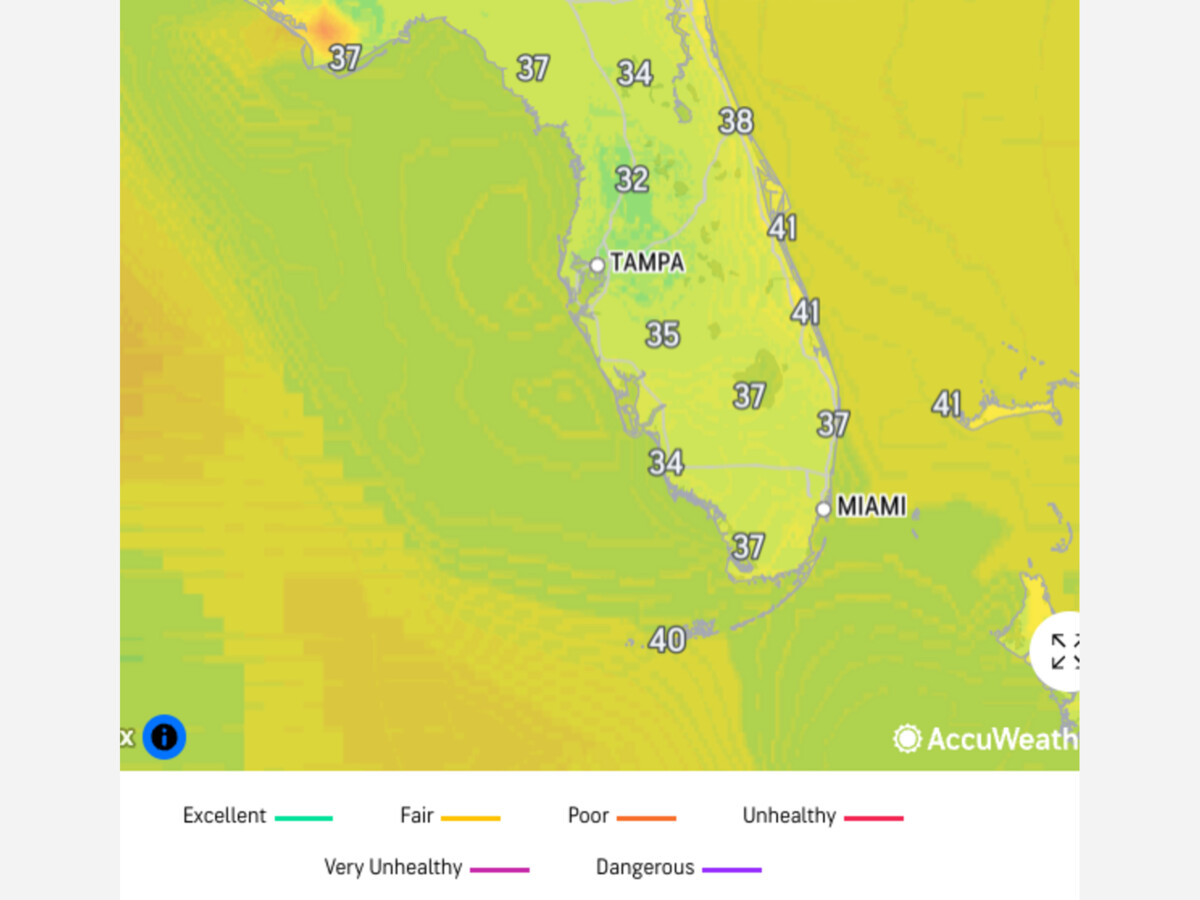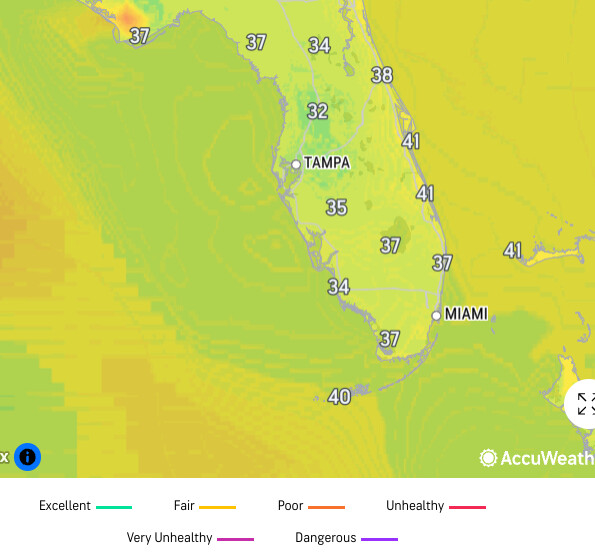Image

Tidings Media gets weather data from AccuWeather, as part of our Tidings TideWatch Storm Center coverage in affiliation with the National Weather Service's NOAA Weather-Ready Nation Ambassador™ initiative.
There's something that we are following that is worth bringing to your attention.
As of Sunday May 7th, the air quality for the Tampa Bay area is rated "fair" by AccuWeather.
https://www.accuweather.com/en/us/tampa/33602/air-quality-index/347937
The scale ranges from Excellent down to Fair to Poor to Unhealthy to Very Unhealthy to Dangerous. So while a rating of "fair" may cause some trouble for sensitive groups that may experience some minor to moderate reactions, most people will find "fair" acceptable for outdoor activities.
Areas north of Tampa around Hernando County are creeping up to "excellent" while Sarasota to our south issued an air quality warning on Friday May 5th. The rest of the week will see the Tampa area stay in the "fair" range.
Sarasota County has issued an air advisory for elevated ozone levels and/or the potential for elevated ozone levels that fall within the “unhealthy for sensitive groups” category, per Environmental Protection Agency (EPA) national ambient air quality standards for public health. The elevated levels were detected Friday, May 5, at the 17th Street Paw Park.

As we continue to build out the Tidings TideWatch Storm Center, we'd encourage you to take a free subscription as we will send out emergency weather alerts in coordination with Pasco, Pinellas and Hillsborough emergency management communications and the National Weather Service. Tidings Media is a part of the NOAA Weather-Ready Nation Ambassador™ initiative.

When you think of the effects of air quality issues, you might think of visible smog that forces people to wear masks and causes coughing. However, air quality has a lot more to it than these visible effects. Here are some air quality facts that may surprise you.

Photo by ltaf Qadri
ltaf Qadri
You don't need to live near a hotspot for pollution to feel the effects it has on air quality. Weather changes and atmosphere can carry air with poor air quality all across the globe. Even thousands of miles away, the air quality in one area has the potential to affect you.

Photo by JuergenPM
JuergenPM
There are three main forms of pollution that negatively impact air quality. Nitrogen dioxide, particulate matter, and ozone near the ground all pose risks to your health when you breathe them in. These pollutants trigger or exacerbate health problems for many people.

Photo by Ahmad Gunnaivi
ahmad gunnaivi
How can you know if the air quality in your area is affecting you? The symptoms of air quality issues typically include shortness of breath or irritation to the eyes, nose, and throat. If you have respiratory issues such as asthma, low air quality will make those issues worse. Poor air quality can even damage the cardiovascular system, including your heart. The longer you're exposed to low air quality, the worse the problems can become. Poor air quality doesn’t just impact physical health, it can also cause mental health to deteriorate. A 2017 study found exposure to higher levels of finer particulate matter is associated with higher levels of psychological distress.

Photo by Pablo Orcaray
Pablo Orcaray
On average, an adult breathes over 2,000 gallons of air per day. That's a lot of air! If the air quality is low, all that breathing will quickly result in health problems. And with physical exertion, you breathe in even more air.

Photo by Marco Ugarte
Marco Ugarte
Over time, health-related air quality issues will grow. Long-term exposure can result in an early death: that's how serious air quality is.

Photo by Mabel Amber
Mabel Amber
When it comes to most health risks, more exercise is part of the solution. But when it comes to air quality, more exercise will only make things worse. Even if you work out indoors, indoor air can also be impacted by air quality concerns. However, an outdoor workout puts you the most at risk. When you exercise, you take faster, deeper breaths, which gets the pollution into your respiratory system even faster. Whether you work out because you want to, or you do physical activity for your job, getting exercise when the air quality is low can cause more harm than good.

Photo by Kin Cheung
Kin Cheung
You might think that children breathe less air than adults since they're smaller. But in truth, children actually breathe more than adults and tend to be more sensitive to air pollution. Because children are smaller, they have narrower air passages. This means it takes less inflammation to block the airways of a child. Children also often do more physical activity and spend more time playing outside than adults do. This outdoor time means the effects of a low air quality index build up even faster in kids. Plus, kids are more prone to asthma, which makes air quality effects even worse.

Photo by Matteo Vistocco
Matteo Vistocco
Seniors are another population that's especially vulnerable during an air quality alert. If seniors have existing heart or respiratory problems, that makes the risk even worse. However, in general, the health risks associated with old age become more threatening when air quality levels drop.

Photo by Matteo Vistocco
Matteo Vistocco
Air quality doesn't just pose a risk to human health. These issues can also pose a risk to the environment and nature. Animals who breathe low-quality air can also suffer from respiratory and related issues. However, even airborne pollution that doesn't affect humans and animals can still impact the environment. Even crops can suffer, as rising ozone levels damage vegetation.

Photo by Firdia Lisnawati
Firdia Lisnawati
There is no one culprit for low air quality. Some air quality issues have natural causes, while others are manmade. For example, volcanic eruptions can significantly damage air quality. However, burning fossil fuels, agriculture, manufacturing, and other human activities can also harm air quality.

Photo by Firdia Lisnawati
Firdia Lisnawati
Not everyone is aware of all these air quality facts. However, each year in May, Air Quality Awareness week serves to call attention to important air pollution facts like these. Knowledge and research play an important role in the future of our air quality.

Photo by Jack Hamilton
Jack Hamilton